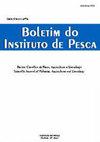Enrichment of Artemia sp. with autochthonous probiotics at different levels in larviculture of piauçu Megaleporinus macrocephalus
IF 0.6
4区 农林科学
Q4 FISHERIES
引用次数: 0
Abstract
The research investigated the effect of dietary supplementation with Artemia sp. enriched with the autochthonous probiotic Enterococcus faecium on growth performance, microbiota modulation, intestinal morphology, and resistance to pathogenic bacteria of Megaleporinus macrocephalus larvae. The study evaluated four treatments (C: without probiotics; T1: 1 × 104 ; T2:1× 106 ; and T3: 1 × 108 CFU·mL-1) in quadruplicates. The larvae (n = 160; weight = 5.3 ± 2.3mg and length = 3.73±0.4mm) were distributed in 16 L containers at a density of 10 larvae·L-1 for 20 days. The productive performance, survival, gut microbiology, and histology were measured. The larvae were also submitted to acute challenge against the pathogenic bacterium Aeromonas hydrophila. The results showed that supplementation with 1 × 108 CFU·mL-1 promotes greater gain in length (13.78 ± 0.40 cm) and total weight (0.08 ± 0.002 g), higher counts of lactic acid bacteria and lower total heterotrophic in the intestines (7.11±0.30; 0.12 ± 0.09 log CFU·g-1, respectively) and larger villi (0.26 ± 0.03μm). Diets containing probiotics influenced the animals’ resistance to acute infection, with a lower accumulated mortality in T3 (33% ± 11.54%) and a higher one in C+ (93% ± 11.54%). Thus, probiotic supplementation with the autochthonous bacterium E. faecium (1×108CFU·mL-1) provides zootechnical improvement, villus increase and greater resistance to infections.不同水平的本地益生菌在大头巨虾养殖中对蒿属植物的富集
本试验研究了饲粮中添加富含原生益生菌屎肠球菌的青蒿对大头巨孢子虫幼虫生长性能、菌群调节、肠道形态及对致病菌抗性的影响。该研究评估了四种处理方法(C:不使用益生菌;T1: 1 × 104;T2:1× 106;T3: 1 × 108 CFU·mL-1)。幼虫(n = 160;体重= 5.3±2.3mg,体长= 3.73±0.4mm),以10只·L-1的密度分布于16 L容器中,饲养20 d。测定生产性能、存活率、肠道微生物学和组织学。幼虫也接受了病原细菌嗜水气单胞菌的急性攻击。结果表明:饲粮添加1 × 108 CFU·mL-1时,仔猪体长(13.78±0.40 cm)和总重(0.08±0.002 g)增加,乳酸菌数量增加,肠道总异养性降低(7.11±0.30;0.12±0.09 log CFU·g-1)和较大的绒毛(0.26±0.03μm)。饲粮中添加益生菌可提高动物对急性感染的抵抗力,T3期累积死亡率较低(33%±11.54%),C+期累积死亡率较高(93%±11.54%)。因此,补充原生细菌E. faecium (1×108CFU·mL-1)的益生菌可以改善动物技术,增加绒毛并增强对感染的抵抗力。
本文章由计算机程序翻译,如有差异,请以英文原文为准。
求助全文
约1分钟内获得全文
求助全文
来源期刊

Boletim do Instituto de Pesca
FISHERIES-ZOOLOGY
CiteScore
0.80
自引率
0.00%
发文量
24
审稿时长
>12 weeks
期刊介绍:
To publish original articles of research and short communications in the following áreas: Fisheries, Aquaculture, Zootechnology, Limnology, Oceanography, Biology and Pathology of aquatic organisms. The publication depends on the approval of the Editorial Board, based on the peer review.
 求助内容:
求助内容: 应助结果提醒方式:
应助结果提醒方式:


